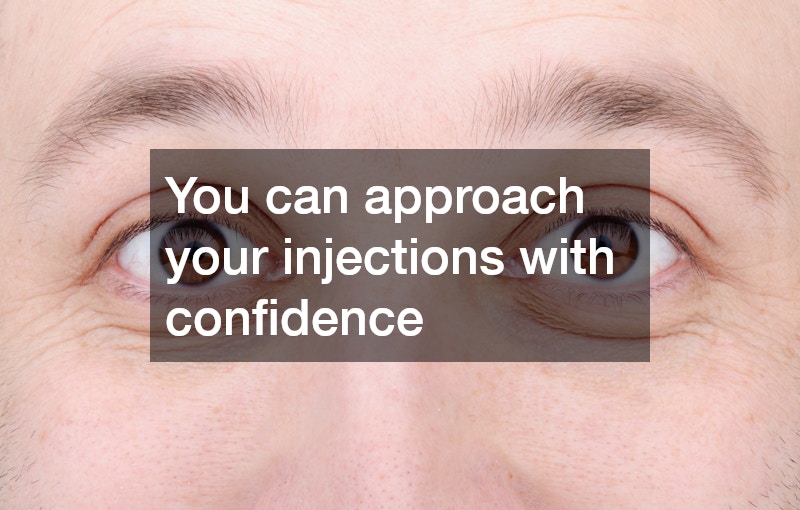Macular degeneration is a common yet serious eye condition that can affect daily life by diminishing central vision. For those diagnosed with the “wet” form of age-related macular degeneration (AMD), injections are a primary treatment option, slowing vision loss and, in some cases, preserving sight. If you’re considering macular degeneration injections or already receiving them, it’s essential to discuss specific questions with your doctor to ensure you fully understand the treatment process, its benefits, and any potential risks. Here are seven key questions to ask your doctor about macular degeneration injections.
1. What Are the Potential Side Effects?
While macular degeneration injections are generally safe, they can sometimes cause side effects, including temporary eye discomfort, redness, or blurred vision immediately after treatment. In rare cases, more serious side effects, such as infection, inflammation, or increased eye pressure, may occur. It’s essential to discuss potential risks with your doctor to understand what to expect and learn about warning signs. Knowing about side effects can help you prepare mentally and identify when to seek immediate medical attention if something unusual arises.
2. How Often Will I Need Injections?
The frequency of macular degeneration injections can vary from patient to patient, depending on individual responses to treatment and the medication being used. While some patients require monthly injections initially, others may transition to a bimonthly or less frequent schedule as their condition stabilises. Your doctor will assess the best approach for you based on the progression of your AMD. Asking about the treatment schedule can help you plan your visits and prepare for potential adjustments based on how your vision responds over time.
3. Will the Injections Improve My Vision?
It’s natural to wonder whether macular degeneration injections will improve your vision or simply prevent further deterioration. While these injections are highly effective in slowing or halting AMD progression, actual vision improvement varies. Some patients experience modest vision gains, while others may notice stabilisation with minimal improvement. Discussing expectations with your doctor can provide a realistic understanding of your individual outlook and help you focus on the positive long-term effects of treatment.
4. Are There Any Lifestyle Adjustments I Should Make?
After receiving macular degeneration injections, it’s common to be advised to avoid certain activities for a short period. For example, your doctor may suggest refraining from swimming, heavy exercise, or strenuous activities for a day or two after treatment to prevent complications. Discuss any lifestyle adjustments necessary to ensure a smooth recovery and protect your eyes. If certain adjustments are recommended, it may be helpful to ask for specific time frames to understand when you can resume regular activities.
5. How Can I Best Prepare for My Injection Appointment?
Preparation for macular degeneration injections may vary slightly depending on the type of injection and individual circumstances. Generally, no major pre-treatment steps are required, but your doctor may provide instructions to follow. Asking for advice on preparation, such as bringing sunglasses to protect your eyes from light sensitivity after the injection, can make the experience smoother. Preparation details help reduce any discomfort and ensure you’re equipped to handle temporary side effects after the procedure.
6. What Should I Expect Immediately After the Injection?
It’s helpful to know how you might feel immediately following an injection. Most patients report mild discomfort, light sensitivity, or a gritty sensation in the eye, which typically subsides within a day or two. Asking about post-treatment expectations helps prepare you for any temporary discomfort and reassures you about the typical recovery process. Your doctor can also provide advice on managing side effects, such as over-the-counter eye drops to ease any mild irritation.
7. What Follow-Up Care Will Be Necessary?
Regular follow-up appointments allow your doctor to monitor the effectiveness of macular degeneration injections and adjust treatment if needed. During these check-ups, they may perform eye exams or imaging tests to assess your retina’s health and gauge treatment success. Asking about the recommended follow-up care schedule ensures you stay on top of your AMD management, enabling proactive adjustments as required.
Asking the right questions about macular degeneration injections can greatly enhance your understanding and comfort with the treatment process. By discussing specifics with your doctor—from the type of medication and potential side effects to long-term expectations and lifestyle considerations—you gain valuable insights that support a smoother, more effective treatment journey. Staying informed and actively involved in your care empowers you to make decisions that protect your vision and maintain quality of life. With this information, you can approach your injections with confidence, knowing you’re taking essential steps to manage AMD effectively.

